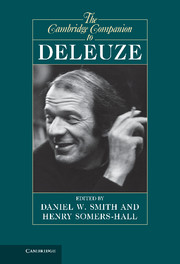Book contents
- Frontmatter
- Contents
- Contributors
- Abbreviations
- Introduction
- 1 Deleuze and the history of philosophy
- 2 Difference and Repetition
- 3 The Deleuzian reversal of Platonism
- 4 Deleuze and Kant
- 5 Phenomenology and metaphysics, and chaos
- 6 Deleuze and structuralism
- 7 Deleuze and Guattari
- 8 Nomadic ethics
- 9 Deleuze’s political philosophy
- 10 Deleuze, mathematics, and realist ontology
- 11 Deleuze and life
- 12 Deleuze’s aesthetics of sensation
- 13 Deleuze and literature
- 14 Deleuze and psychoanalysis
- 15 Deleuze’s philosophical heritage
- Bibliography
- Index
10 - Deleuze, mathematics, and realist ontology
Published online by Cambridge University Press: 05 December 2012
- Frontmatter
- Contents
- Contributors
- Abbreviations
- Introduction
- 1 Deleuze and the history of philosophy
- 2 Difference and Repetition
- 3 The Deleuzian reversal of Platonism
- 4 Deleuze and Kant
- 5 Phenomenology and metaphysics, and chaos
- 6 Deleuze and structuralism
- 7 Deleuze and Guattari
- 8 Nomadic ethics
- 9 Deleuze’s political philosophy
- 10 Deleuze, mathematics, and realist ontology
- 11 Deleuze and life
- 12 Deleuze’s aesthetics of sensation
- 13 Deleuze and literature
- 14 Deleuze and psychoanalysis
- 15 Deleuze’s philosophical heritage
- Bibliography
- Index
Summary
REALISM IN HISTORY
Unlike most of his contemporaries, Deleuze was a realist philosopher. But his realist stance was deeply innovative and constituted a sharp break with the brand of realism that dominated Western thought for 2,500 years, the one created by Aristotle. As is well known, the Greek philosopher’s world was populated by three categories of entities: genus, species, and individual. Entities belonging to the first two categories subsisted essentially, those belonging to the third one subsisted only accidentally. The genus could be, for example, Animal, the species Human, and the individual this or that particular person characterized by contingent properties: being white, being musical, being just. A genus was linked to its various species (Horse, Human) by a series of logically necessary subdivisions. The genus Animal, for example, could be subdivided into two-footed and many-footed types; then subdivided into differences in extremities: hooves, as in horses, or feet, as in humans. When we reached a point at which any further distinctions were accidental, like a foot missing a toe, we arrived at the level of the species, the lowest ontological level at which we could speak of an essence or of the very nature of a thing.
Possession of these essential traits is what guaranteed the mind-independent identity of things in Aristotelian realism. It follows that any new brand of realism, if it is to be truly novel, must replace the categories of genus and species with something that does not imply an ontological commitment to transcendent entities (essences). This task is easier for species than for genera. The transcendent nature of species can be eliminated simply by transforming them into historical entities, like Darwin did. In evolutionary theory a biological species is as singular, as unique, and as historically contingent as an individual organism: a species is born when its gene pool is closed to the flow of genetic materials from other reproductive communities – that is, it is born through reproductive isolation – and its dies through extinction. In other words, species like organisms are “subject to corruption and decay,” as Aristotle would say. And their defining properties are not logically necessary.
- Type
- Chapter
- Information
- The Cambridge Companion to Deleuze , pp. 220 - 238Publisher: Cambridge University PressPrint publication year: 2012
- 5
- Cited by



